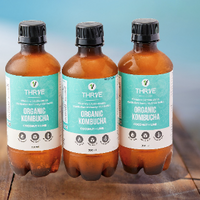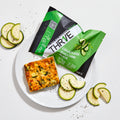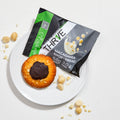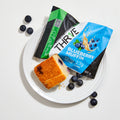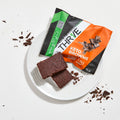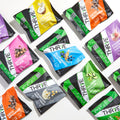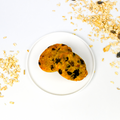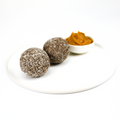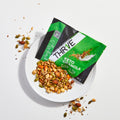Fading in your 3pm conference call? Struggling to charge through a seemingly endless to-do list? Turns out, you can eat your way to a more productive day. These three nutrition hacks will get you on track.
 Snack right
Snack right
Hunger is the number one enemy of concentration and focus. Sure, you don’t want to be snacking all day – but you might need a pick-me-up when those morning meetings are stretching well into the afternoon. Thanks, chatty Chad in the 11am catch-up.
Sure, we all know the biscuits and chocolates in the office kitchen aren’t the best nutritional choice. Yet putting the health pitfalls aside, the sugar crash afterwards is going to make that long afternoon feel a whole lot longer. To avoid this and stay productive, look for snacks containing a good source of protein, that are relatively low in carbs and free from refined sugar. This will stop you running to the vending machine an hour later (we’ve all been there).
The classic go-to is a nut and seed mix – it offers a good source of protein and healthy fats. Almonds and hazelnuts are both great choices, they offer concentrated source of vitamin E, which is critical for cognitive health. Walnuts are also a nutritious option, thanks to their omega-3 fatty acids, which support brain health. If nuts aren’t your thing, opt for a great quality low-carb lean protein, simply mix with water or unsweetened almond milk.
Another top snack choice, that admittedly is a little left of field, is a good quality beef or chicken bone broth. Let’s be honest, it’s no Snickers bar. But it’s healthy comfort food that’s surprisingly filling, with around 10g of protein per serve. Plus, it offers a host of healthy benefits – it has anti-inflammatory properties, supports your immune system and is great for your gut and digestion. Bonus: it will warm you up when the office air-con is set to arctic mode.
Get fat
Well, good dietary fats anyway. Your brain is nearly 60% fat – it needs dietary fat to function correctly. Contrary to what we’ve been taught in the past, low-fat diets are one of the worst choices you could make for your cognitive health. To keep your brain and memory sharp, you should include healthy monounsaturated fats in your diet. A study in the Annals of Neurology found that women who had high amounts of them had better cognitive function over the course of four years. Think nuts, olive oil and the millennial favourite, avocado. Smash an avo and you won’t be struggling to recall the seventh action item from your last meeting.
Omega-3 fatty acids, which are a type of polyunsaturated fat, are also essential for brain function. They help improve learning and memory, as well as help ward off more serious issues such as depression and dementia. An analysis in the journal Nature Reviews Neuroscience found these fatty acids are crucial to support synapses in the brain. Synapses connect neurons and provide critical functions. “Omega-3 fatty acids support synaptic plasticity and seem to positively affect the expression of several molecules related to learning and memory that are found on synapses,” said the lead author of the review, Fernando Gómez-Pinilla, a UCLA professor of neurosurgery and physiological science. “Omega-3 fatty acids are essential for normal brain function.”
The best source is wild-caught oily fish like mackerel, salmon and tuna. There are also plant-based sources, such as walnuts and chia seeds. Take-home: ensure your work lunches are rich in good fats – and free from harmful fats, such as those found in toxic vegetable and seed oils.
Drink!
We sure wish our advice was to head for a post-work wine – but drinking water throughout the day will be more productive. Even very mild dehydration can impact your concentration, found two studies from the University of Connecticut. One showed that mild dehydration caused headaches, fatigue, and difficulty concentrating in women. Women who were dehydrated also perceived tasks as being more difficult. Another University of Connecticut study in men found mild dehydration caused some difficulty with mental tasks, particularly in the areas of vigilance and working memory. Whether you workout before work or not – hydration matters. Both studies found it didn’t matter if a person had just walked for 40 minutes on a treadmill or were just sitting – the adverse effects from mild dehydration were the same.The real issue is, by the time you’re thirsty – you’re already dehydrated. “Our thirst sensation doesn’t really appear until we are 1 or 2 percent dehydrated,” says Lawrence Armstrong, one of the study’s lead scientists. “By then dehydration is already setting in and starting to impact how our mind and body perform.” Sure, it’s not the most exciting advice – but it’s essential to keep sipping to stay focused.
THR1VE has a range of healthy ready meals and snacks that can be delivered to your home or office. Enjoy the delicious power of extraordinary health every day! Explore the range here.

 Snack right
Snack right
